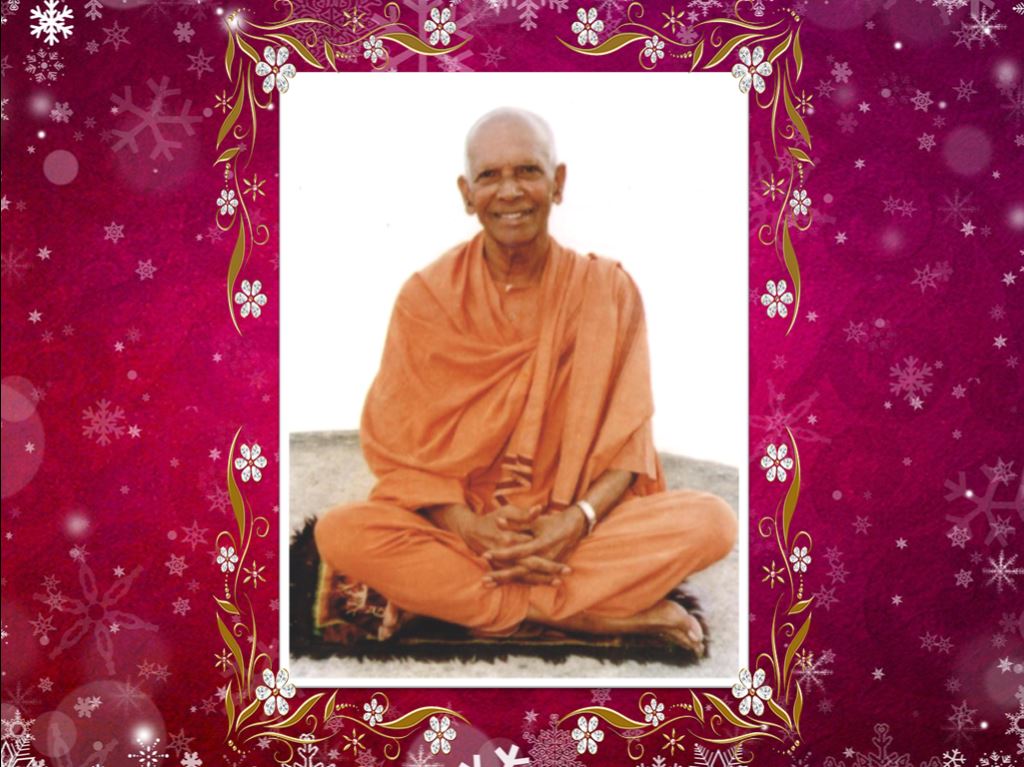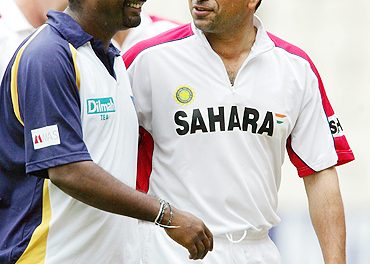VOLUME IX
OBEISANCE

SWAMI RANGANATHANANDAJI MAHARAJ
FORMER PRESIDENT
SRI RAMAKRISHNA MATH AND MISSION
Enlightened Prof. N. Shanmugam with a definition of an “INDIAN”.
VOLUME IX – CHAPTER 1
PERSONALITY DEVELOPMENT

Today India is mad after cricket. Cricketers are the modern heroes. Even boys in the rural areas play cricket with a cover ball and improvised stumps. Of all the three aspects of cricketing Batting, Bowling and Fielding, the last one is very important and tough. It involves several important concepts which will be useful to you as a principal. If you are interested in developing the personalities of your pupils, if you are a cricketer yourself, then it is wonderful! If you had been a good Fielder, then you are cut out for the Principal’s post!The author’s mind was provoked to think as above when 15 years back he read a fascinating article by Nirmal Sekhar in “The Hindu” – that brilliant columnist whose prose sounds like poetry. The author has adapted his ideas to the work of a Principal. In some places the author has used Nirmal Sekhar’s own words as they can’t be substituted, summarised or paraphrased.
As a Principal you are 3 in 1 person – you have to bowl, bat and field – you have to teach, have to administer and also develop your staff and students. All these have to be done outside your chamber. You have to come out into the field. Nothing can excite the spontaneous delight, as a perfect piece of work in the field. No one can teach you to act like a Principal. You have to teach yourself daily, buffeted and battered by the issues that face you.
Never think of your wok as a passive drudgery, but look at it as an exacting science. With every issue that crops up, you should be alive, alert, positive, aggressive and even though it may take a long time to resolve, wait patiently to seek perfection and fulfilment in your work.
There are some positions in the field whose character calls for peculiar development. Slips call for quickness of hand and eye, unflagging concentration and eternal vigilance. A fine slip fielder to a certain et-tent is a specialist not easily replaceable and sometimes not place able elsewhere. Like this person can you specialise in some area in such a way that your organisation will consider you irreplaceable for that type of work.
In KVS we have schools located in Defence Service Stations, Institutions of Higher Learning, Project Schools and Religious Centres. Sometimes problems arise in these schools because as the author had observed there had not been a proper fit of the Principal and the Institution where it is located.
For a school in a Defence Station, a person who is straight forward, knowledgeable, good sportsman will easily adapt himself to the atmosphere there.
The good out Fielder by contrast, is not called for immediate reaction of hand and eye, but must develop quite different qualities of immediate judgement, swiftness of foot, economy of movement in gathering the ball and lastly the ability to throw the ball with speed and accuracy.
In Principal posted in a School in an Institution of Higher Learning like LIT, HSC, IMM, CLRI, NAL should have a Hi cell Intellectual Acumen, sharpness in thinking, crisp expression with brevity and capacity for quick replies in conversation. He must be able to evoke respect from the staff of those institutions by being authoritative in the academic field.
The most exacting place in the field is the cover point, that post of honour which is the key position for giving the batsman a run out. Every time the ball is hit with moderate speed to the cover point there exists a nice question of the possibilities of gaining a run or of losing a wicket. The ideal cover fielder must have unusual physical qualities and exceptional quickness and accuracy.
As the ball is struck towards him, he must fly to it in such a way that he takes it clearly with his throwing hand while that hand behind the body is in a position ready to throw. At the same time while he is watching the approaching ball he must observe by a sort of second thought through the corner of his eye and position of both the batsman, so that he knows without a further glance which of them is farthest from safety.
If conditions demand that he throws to the wicket-keeper’s end, he must throw the ball like lightning at the stop of the stumps, all in the same movement with the gathering of the ball and at full toss.
If reverse conditions prevail, his problem is easy. He must direct the throw according to the situation and to the bowler’s capacity.
If in mid career down the half way pitch, the ball must be thrown full toss at the top of the wicket at a pace with the bowler’s powers of catching.
In a school run by a project where all expenditure – capital and revenue – is MLT by the project authorities, the principal has to have the above qualities. He must carefully manoeuvre every step so that he gains his goal or avoid any embarrassing situation.
All these decisions must be taken automatically in the very act of fielding the ball, lest the vital tenth of a second is lost. Brilliant execution is not enough. There must be good judgment too. Good fielding is the sweetest sight. If you are sleepy and lackadaisical, it is like a squeaky instrument in an orchestra which is enough to ruin the perfection of a fine performance.
To the staff and students your great fielding (of problems and persons) will be like ambrosia.
When the author was Dy. Director he had to visit villages of ten. The villagers, though peaceful normally, will be touched to the quick, if a careless word escapes from our mouth and can become suddenly volatile.
Only if we can show that we can also speak in their language at that tense moment, then they will calm down. The author always used to stand by the side his seat in the jeep (left hand drive jeep) with his left hand having a firm grip on the tyre lever which he always kept there. As the feelings (balls) come out from the villagers we have to be ready to field them in an appropriate way.
Similarly in the school when you face a turbulent staff bent on creating a problem, then when you talk to him, simultaneously see how those around you react and your response should be steered accordingly. When a staff wants to hit you below the belt, he/she may easily level a charge of corruption or moral turpitude. If all along, before that, your hands had been utterly clean, your behaviour with lady staff beyond any doubt, then you can clearly ward off the charge because they will vouch for your unsullied character. In Govt. service this is common. If the batsman (staff) belongs to a special category, then your fielding (handling) must be very carefully orchestrated – each word chosen carefully, measured accurately, chiseled finely and shaped into an innocuous form and then expressed leaving no room for “catching” you on the wrong foot-even as the fielder is observed by several, you keep some spectators (witnesses) with you when you talk to him. Whenever the author was talking to a ‘problem’ person, he used to have a recorder in the cupboard (slightly open) switched on and have the whole conversation discreetly recorded for future corroboration if need be.
While dealing with all “such casts” you have to build enough and credible documentary evidence to support your statements later on.
When a parent starts speaking in an aggressive and offensive tone, bring down your voice. Show no trace of emotion. Be very frugal in your expression. And give your answer in the form of a brief and pithy statement with two options for him to choose. It will put him in the dock.
When the author was Principal of K.V. AFS, Avadi, a Muslim Air Force Officer met him with great tension and said, “I don’t want my son to study Sanskrit” and gave a long explanation for it. The author heard him very patiently and calmly replied, “Sir, if you want your son to study in K.V. he has to study Sanskrit Sir.” If you don’t want your son to study Sanskrit, then you can take his Transfer Certificate. Please take five minutes to decide and tell me your choice.”
That settled the issue. He meekly said, “I want my son to study in K.V.” The author said, “Sir, I am happy that you have made a good decision in the interests of your son’s future.”
In all such situation, the author used to address such people with a couple of ‘Sirs’ to feed their ego.
On another occasion when a staff came in a highly transparent dress, the author told her just one sentenced,
“The mirror at your home wants to see you.”
The next day that staff apologized.”
Occasions may come in your daily work when you may have to use all the aforesaid skills of a fielder in facing, dealing, handling, and managing problems and challenges.
~~~~~
ONE WHO KNOWS (VOLUME IX – CHAPTER 1)
(DIMENSIONS OF THE LIFE AND WORK OF A PRINCIPAL)

1149) One who exhorts his girl students by citing them examples of young women leaders in business in India and their messages for girls.
1150) One who focuses giving
a) GRATITUDE:
Mentors, heads and colleagues – if they have helped you with time, information and connections , express your gratitude. Write letter saying thanks – that helps them to enjoy what they have done to your growth.
b) REPUTATION:
Has someone helped you with inputs. Refer them to others. Even in their absence praise them. Public recognition enhances their credibility, makes them feel happy about you for your reciprocal gesture.
c) INFORMATION:
Pay attention to what people are struggling with. Do you think you can give some in puts which will facilitate their work? Can you give without asking anything in retun? If you are known to be selfless, more people will gravitate towards You.
d) CONNECTION:
Develop multiple connections. Increase your network of you connect people with others, you multiply their effectiveness.
e) TRUST:
Are you afraid to share because that info may be used against you? Be open and authentic. The more you share, the more trust you built up. People feel safe in the space you provide.
| a | Zahabiya Khorakiwala, M.D.,Wockhardt Hospitals Ltd. | “Have the courage to make your own choices and the perseverance to stick by those choices.” |
| b | Suchi Mukherjee, Founder –Limeroad | “You need the fighter gene to succeed and you must be prepared for failures. Resilience is vital for success.” |
| c | Shinjini Kumar, CEO, Paytm | “Life is along term game. Don’t despair if things are different when You come back from a break.” |
| d | Smita Bhagat, Head-e-commerce, HDFC Bank | “Lead by example if you want to make a real difference.” |
| e | Monica Gupta, Founder, Crafts Villa | “Find what you love to do and work will always be fun.” |
| f | Debarati Sen, MD, 3M India | “Embrace the opportunities that comes your way.” |
| g | Samina Vaziralli, Executive Vice Chairman, Cipla. | “Believe in yourself.” |
| h | Bhavna Doegar, Senior VP, Genpact | “You need a strong internal focus of control to know who you are.” |
| i | Sucharita Mukherjee, CEO, IFMR Holdings | “Don’t wait to be given opportunity, ask for it yourself.” |
| j | Rekha Ranganathan, Head-Innovation, Philips Health Care | “Build on your own strengths and develop your own leadership style.” |
| k | Radhika Piramal, Vice Chairperson of VIP Industries | “Take time to think about your personal and professional goal.” |
| l | Mansi Madan Tripathy, MD, Shell Lubricants | “Have a sense of purpose, be clear about why you are working.” |
| m | Gunjan Soni, CMO, Mynthra | “Jump in and do what you love things have a way of working out if You are passionate about it.” |
| n | Shweta Jalan, MD-Advent international | “While maintaining the fine balance between home and work, remember this too shall pass.” |
| o | Sripriya Kalyana Sundaram, VP-Cognizant | “Love yourself, take care of yourself.” |
| p | Chandrika Pasricha, CEO, Flexing it | “Build net works, of both mentors and peers.” |
| q | Priyanka Agarwal, Partner and Director, Health Care, Boston Consulting Group. | “Don’t over analyse and be hard on yourself.” |
| r | Shradha Sharma, Founder, @yourstory.com | “Think about what really gives you energy and give it your absolute best.” |
| s | Deepika Arora, Regional Vice President, Wyndham Hotels | “Learn, learn, learn, if you don’t know something, don’t hesitate to ask.” |
| t | Prabha Narasimhan, VP.,W.U.L. | “Be clear about your priorities and who is impacted by them. Trust in Your ability and choose your life partner carefully.” |
| u | Anusha Shetty, CEO, Autumn Worldwide | “Never feel guilty about the choices you have made.” |
| v | Pavitra Singh, Associate Director, Pepsico India | “Raise your hand and let people know you are up for challenging roles.” |
| w | Abanti Sankara Raman, CRO, United Spirits | “Be confident about your own Leadership style. You don’t have to act like a man.” |
| x | Ambita Pandey, VP, Walt Disney India | “Lean in, Be prepared to hear “No”” |
| y | Karan Nanda , Advocate, Supreme Court terms. Don’t ever feel you must play by the rules of the Old Boys Club.” | “Stand outside the patriarchy and engage with it on your own terms. Don’t ever feel you must play by the rules of the Old Boys Club.” |
| z | Bindu Ananth, Chair – IFMR Trust |
“Pay it forward. Create opportunities for others.” |
1151) One who has learnt five things from M.S. Dhoni, Cricket Captain.
a) Stay calm in turbulent times tackle the situation with clear head to make right decisions.
b) Build on small beginnings start, keep it and believe that even the biggest goals can be met.
c) Learn continuously:
Study your field closely and work on improving yourself in every aspect of it. While you may not become the greatest Principal, constant learning can definitely make you more successful in reaching your goal.
d) Be humble:
Never allow your success to go to your head.
e) Have faith in what you believe in. Very few people go against the head, but those who did often turn out to
be the biggest winners.
~~~~~
THE World today is in a very bad state. The situation can improve only through Asthikas, who are believers in Divinity. They should become Prema Swaroopas or Embodiments of Love and by their Sadhana, backed by patience, forbearance and compassion, play their role in serving Society and contributing to the betterment of the World. God is present in you and is visualizing through thousands of eyes what you do. Even when no one is seeing, God is watching your actions always. Do everything with this awareness.- Bhagawan Sri Sathya Sai Baba




